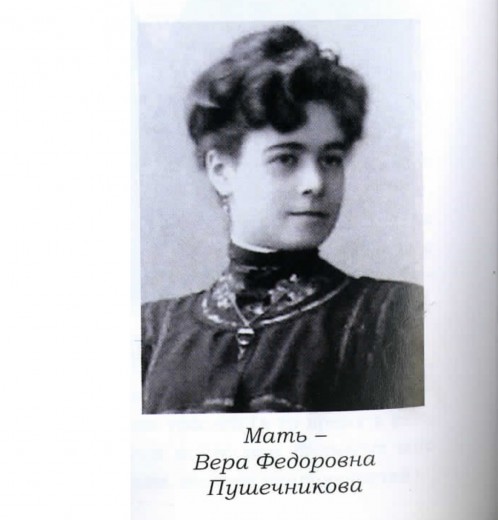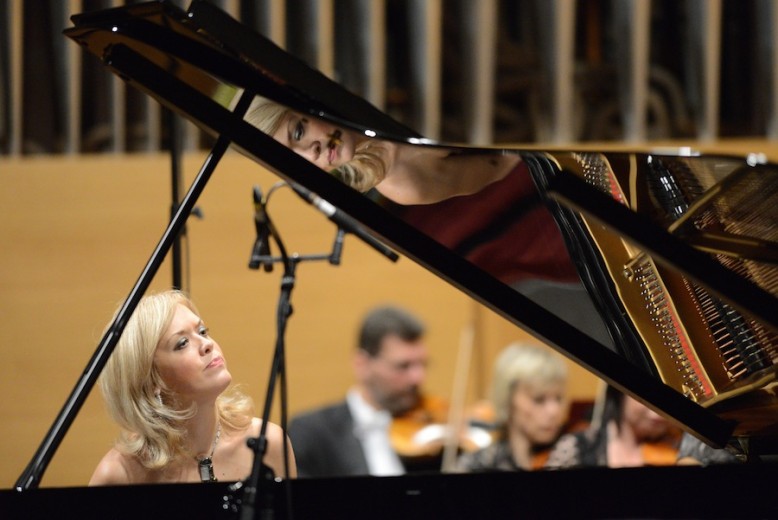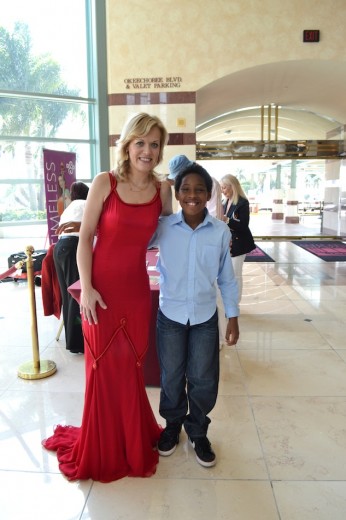In the realm of music, pianist Olga Kern’s family tree is like the monumental Hyperion sequoia in California.
Her great-great grandmother Pelageya Safronovna Pushechnikova was a good friend of Tchaikovsky, as evidenced by the family’s collections of photos and correspondence from the Russian composer. Her great-grandmother, Vera Fedorovna Pushechnikova, was a mezzo-soprano who was accompanied by Rachmaninoff when she performed his romances and songs. Her father was a pianist in the Bolshoi Theater Orchestra for many years.
Kern’s mother was also a pianist and her first teacher. Kern, who learned Rachmaninoff’s Third Piano Concerto as a teen, says that her mother played the work, considered among the most technically demanding for pianists, constantly when she was pregnant with her. It certainly worked. In 2001, at the age of 25, performing that concerto, Kern became the first woman in more than 30 years to win the gold medal at the Van Cliburn International Piano Competition in Fort Worth.
Representing a major programming coup for the Gina Bachauer International Piano Foundation, Kern will perform works by Rachmaninoff, Schumann and Gershwin on April 29 to close out a spectacular season of solo concerts featuring piano competition gold medalists. The first three offerings featured Bachauer gold medalists: Kuok-Wai Lio, Andrey Gugnin and Changyong Shin. Kern’s concert will start at 7:30 p.m. in the Jeanné Wagner Theatre at the Rose Wagner Center for Performing Arts.
Some 22 years after her historic win at the Cliburn competition, Kern is recognized as among the uppermost elite pianists in the world. She is one of the greatest contemporary interpreters of Rachmaninoff’s piano literature. In Albuquerque, she established the Olga Kern International Piano Competition, recently chosen to be part of the World Federation of International Music Competitions, which includes the Bachauer competition as well. She has a major artistic relationship with the New Mexico Philharmonic.

“I am forever grateful to know that Rachmaninoff personally touched our family with his genius,” Kern says in an interview with The Utah Review.
Kern’s first appearance on stage was in Moscow at the age of seven when she played a Haydn piano concerto. She would win other competitions during her teens before venturing into the international limelight in 2001 at the Cliburn competition. Following her win, she was the subject of Playing on the Edge, a documentary directed by Peter Rosen and Alan Skog.
Just two years earlier, right before her son Vladislav was born in 1999, Kern constantly played the music of Brahms and Schubert during her pregnancy. Today, her son, also a composer and a poet, has embarked on his own impressive career as a concert pianist, which includes works of Brahms and Schubert (of course) in his repertoire. Her son is as adventurous in the arts as his forebears and he thrives on improvisation. In 2020, he published his first poetry book in Russian and landed a contract with the Russian book market’s largest publisher. He operates Beat 101 Beat, a digital music production studio, and is laying plans to launch Unity Arts, a streaming service for artists in classical as well as other genres.
Kern had anticipated that her son would pick up another instrument, especially the cello. But, at the age of three, he insisted that piano would be the only instrument he would study, she recalls. “It has been really special and natural for us to be able to play works for two pianos or four hands.” For example, they have performed Mozart’s Piano Concerto No.10 in E-flat major, K.365, for two pianos, with the New Mexico Philharmonic.
The Kern family name is well known in many international musical circles. In 2012, Kern established the Aspiration Foundation with Vladimir Kern, her brother who is a conductor, composer and teacher.
Kern, who is now a U.S. citizen and a recipient of the Ellis Island Medal of Honor, is forever grateful for the musical heritage of her homeland and her family’s ties to two of its greatest composers: Tchaikovsky and Rachmaninoff. On her website, she has featured photos of her great- and great-great grandmothers. Rachmaninoff’s memoirs cite the dates and venues of her great-great grandmother’s vocal performances.
Kern’s program for her Salt Lake City performance celebrates the 150th anniversary of Rachmaninoff’s birth. Joining shorter pieces will be his Variations on a Theme of Corelli, op. 42, three transcriptions, Schumann’s Carnaval, op. 9 and selections by George Gershwin including Three Preludes and the Earl Wild arrangement of his Virtuoso Etude No. 7, based on Fascinatin’ Rhythm.
The Schumann and Gershwin selections are integral to her tribute to Rachmaninoff. His 1929 recording of Carnaval is considered the standard bearer of this Schumann work. And, after Rachmaninoff arrived in New York City in 1918, he followed the spreading jazz tradition. He was an avid fan of the legendary Art Tatum and followed Gershwin’s career closely. Rachmaninoff also touched his later compositions with jazz inflections, including the Fourth Piano Concerto and others such as the Paganini Rhapsody and the Corelli Variations, the latter work which Kern will perform. The Corelli Variations was the last work for solo piano that Rachmaninoff composed. The eighth variation, for example, sounds bluesy, with its falling triplets, syncopated rhythms and a fairly snappy bass line. The thirteenth variation comprises a single rhythmic motif, along with seventh, ninth and thirteenth chords that are familiar to jazz musicians.
Kern continues to explore new paths in her repertoire. “As pianists, we have such a huge repertoire that one life is not enough to experience it,” she explains. She connects with the innocent joys of Francis Poulenc’s Nocturnes and considers the opportunity to perform his sextet for piano and wind quintet one of her most memorable chamber music experiences. She has collaborated with composers from Australia, Scotland and South Africa. One of her most appreciated world premieres was the 2017 work for piano Window to Eternity’s Threshold (2017) by James Lee III. Lee set the four character movements of the piece, each of which marked a major trial in order for the individual to proceed to the next stage in their journey, culminating in their salvation as they enter paradise.
For more information and tickets about Kern’s forthcoming concert, see the Bachauer website.



